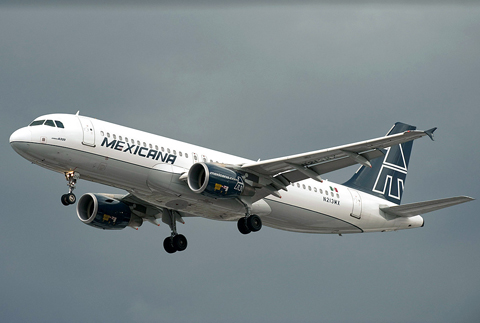A group of Mexican investors has bought a controlling stake in Mexicana airlines in a bid to save the debt-ridden company, the consortium announced on Saturday.
The group, called Tenedora K, said it acquired a 95 percent stake in Nuevo Grupo Aeronautico SA de CV, the holding company that controls Mexicana de Aviacion — Mexicana’s official name — and the domestic airlines Mexicana Click and Mexicana Link.
The group said the pilots’ union would hold the remaining 5 percent of shares.

PHOTO: AFP
Mexicana officials did not return telephone calls seeking comment.
The pilots’ and flight attendants’ unions could not be reached.
The deal was announced in a statement from the consortium released by the private equity firm Advent International. Advent helped put together the deal but is not participating in the consortium.
Tenedora K said the acquisition is a “first step” toward restructuring Mexico’s largest airline. It said the process would involve agreements on finances, operations and labor “without which it will not be possible to save the airline.”
The consortium did not say how much it paid for the controlling share or how much it would invest in the airline.
Mexicana executives said earlier this month that the company needed an infusion of at least US$100 million to keep flying.
The airline filed for bankruptcy protection in Mexico and the US on Aug. 2 while seeking to restructure its costs.
It later stopped selling tickets and suspended some flights.
The company reached a deal earlier this month with pilots and flight attendants in which the unions agreed to new contract terms in exchange for a stake in the company.
In court filings, Mexicana said it was badly hit by the swine flu outbreak last year that scared away travelers for months and by the global economic slowdown.
The airline added that high jet fuel prices and labor costs contributed to its financial troubles.
Mexicana flies to more than 65 national and international destinations, including the US, Canada, Central America, South America and Europe.
It transported 11.1 million passengers last year, according to the company’s Web site.

DEFENSE: The first set of three NASAMS that were previously purchased is expected to be delivered by the end of this year and deployed near the capital, sources said Taiwan plans to procure 28 more sets of M-142 High Mobility Artillery Rocket Systems (HIMARS), as well as nine additional sets of National Advanced Surface-to-Air Missile Systems (NASAMS), military sources said yesterday. Taiwan had previously purchased 29 HIMARS launchers from the US and received the first 11 last year. Once the planned purchases are completed and delivered, Taiwan would have 57 sets of HIMARS. The army has also increased the number of MGM-140 Army Tactical Missile Systems (ATACMS) purchased from 64 to 84, the sources added. Each HIMARS launch pod can carry six Guided Multiple Launch Rocket Systems, capable of

Authorities have detained three former Taiwan Semiconductor Manufacturing Co (TMSC, 台積電) employees on suspicion of compromising classified technology used in making 2-nanometer chips, the Taiwan High Prosecutors’ Office said yesterday. Prosecutors are holding a former TSMC engineer surnamed Chen (陳) and two recently sacked TSMC engineers, including one person surnamed Wu (吳) in detention with restricted communication, following an investigation launched on July 25, a statement said. The announcement came a day after Nikkei Asia reported on the technology theft in an exclusive story, saying TSMC had fired two workers for contravening data rules on advanced chipmaking technology. Two-nanometer wafers are the most

TRAJECTORY: The severe tropical storm is predicted to be closest to Taiwan on Wednesday and Thursday, and would influence the nation to varying degrees, a forecaster said The Central Weather Administration (CWA) yesterday said it would likely issue a sea warning for Tropical Storm Podul tomorrow morning and a land warning that evening at the earliest. CWA forecaster Lin Ting-yi (林定宜) said the severe tropical storm is predicted to be closest to Taiwan on Wednesday and Thursday. As of 2pm yesterday, the storm was moving west at 21kph and packing sustained winds of 108kph and gusts of up to 136.8kph, the CWA said. Lin said that the tropical storm was about 1,710km east of Oluanpi (鵝鑾鼻), Taiwan’s southernmost tip, with two possible trajectories over the next one

CHINA’s BULLYING: The former British prime minister said that he believes ‘Taiwan can and will’ protect its freedom and democracy, as its people are lovers of liberty Former British prime minister Boris Johnson yesterday said Western nations should have the courage to stand with and deepen their economic partnerships with Taiwan in the face of China’s intensified pressure. He made the remarks at the ninth Ketagalan Forum: 2025 Indo-Pacific Security Dialogue hosted by the Ministry of Foreign Affairs and the Prospect Foundation in Taipei. Johnson, who is visiting Taiwan for the first time, said he had seen Taiwan’s coastline on a screen on his indoor bicycle, but wanted to learn more about the nation, including its artificial intelligence (AI) development, the key technology of the 21st century. Calling himself an